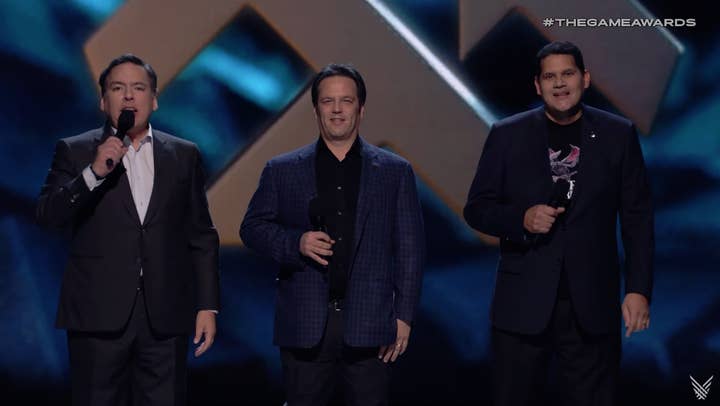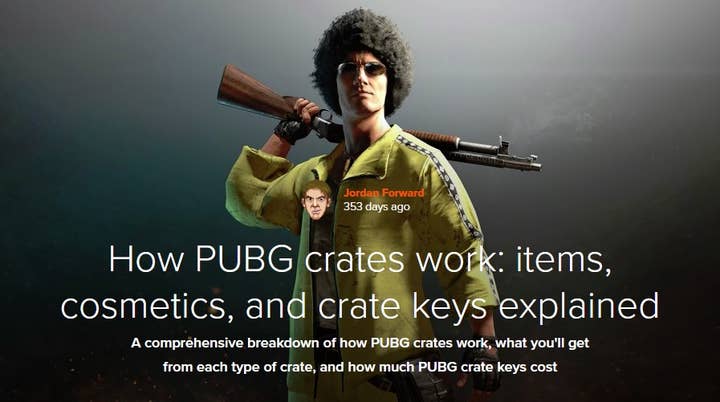Why we're headed toward loot box legislation | Opinion
The games industry is poorly positioned to defend itself on this front, and the fallout could impact a lot more than just loot box mechanisms
Looking back at the early 1990s controversy over gaming violence, it's really quite amazing that the games industry avoided legislation in the US.
In December of 1993, leaders of the industry were called before Congress by Senators Joe Lieberman and Herbert Kohl for a hearing on violence in video games, sparked in large part by the notoriety of games like Mortal Kombat and Night Trap. It was an opportunity to show legislators that this was a responsible industry, one united by a sober understanding of the obligations it had to its customers, one that parents could trust to do right by them and their children.
Naturally, it completely botched that opportunity.

While the industry was technically united in its desire to avoid legislation and adopt a self-enforced rating system, it was divided on everything else. Retailers like Toys R Us and Walmart didn't even respond to the Senate's invitation to appear at the hearing. There was no trade group for video game publishers at the time, so they were primarily represented by Nintendo of America's soon-to-be-chairman Howard Lincoln and Sega of America VP of marketing and communications Bill White. And rather than put aside their differences for their critical shared interests, White and Lincoln devoted much of their congressional testimony to re-hashing the Super Nintendo vs. Genesis console war struggle then playing out on shelves.
Sega and Nintendo devoted much of their congressional testimony to re-hashing the Super Nintendo vs. Genesis console war struggle then playing out on shelves
Lincoln blasted Sega for allowing uncensored fatalities in the Genesis version of Mortal Kombat and for permitting Night Trap to be released on the Sega CD, saying it "simply has no place in our society" because of its depictions of violence against women. He mocked Sega's assertion that games were no longer just for children. And when Sega's voluntary age ratings system came up, Lincoln excoriated his competitor for taking the step only "when they started getting heat" about Night Trap.
(Lest it go unsaid, Lincoln was addressing Congress to advocate for adopting a self-enforced ratings system because the industry started getting heat about its games.)
As for White, he used his time to note that Sega had taken nearly half of the home console market share since it challenged "Nintendo's monopoly over the video game market" two years prior, to talk about Sega beating Nintendo to the CD format, and to show a prepared video clip comparing Street Fighter II on the Super Nintendo (no content warning) with Street Fighter II on the Genesis (rated MA-13).
The senators were clearly unimpressed. Lieberman closed the session by letting the industry know that he would be introducing legislation mandating video game ratings, and all-but-begged Lincoln and White to make it unnecessary by getting on the same page and adopting their own system before lawmakers did it for them.
Thankfully, the message was received. Another round of hearings was held four months later. By then, the largest players in the industry had the beginnings of a trade group in the Industry Rating Council, represented at the hearings by Electronic Arts senior VP Jack Heistand. It also had an encouraging progress report on how the rating system plans were coming along, noting the expected challenges and limitations along the way.
This largely satisfied the legislators and led to the formation of the Entertainment Software Rating Board, which played a key role in future fights over violence in games in the US. Avoiding government regulation of gaming content in the US stands as one of the greatest accomplishments the games industry has collectively made since its inception. It's also one that the industry seems determined to undo.
History Repeating?
Let's bring this around to the current debate over loot boxes and addiction.
You would think the industry is in a better place to stave off legislation now than it was almost 30 years ago. We have an abundance of industry trade groups, for one, with the Entertainment Software Association advancing game publishers' interests in the US. Like many of its international counterparts, the ESA knows its way around a courtroom and has a pretty good track record at thwarting legislative efforts.
And where the early '90s were marked by in-fighting and petty bickering, the console wars seem to be headed to an era of glasnost, with cross-platform play a reality, Nintendo and Microsoft buddying up, and Sony celebrating its rivals' achievements.

So why is the industry poorly positioned to fend off current legislative proposals, like the one Senator Josh Hawley announced last week?
Part of the answer lies with the ESA itself. As Variety reported last week, the trade group has been in "disarray" over the last few years, with the actions and attitudes of former president and CEO Michael Gallagher sowing discord among ESA employees and member companies alike. Then there's the ongoing debate about how best to evolve E3, formerly a must-attend staple of the gaming calendar that has seen influential member companies like Electronic Arts and Sony scaling back or eliminating their participation.
Obviously, none of that has helped. But even if the ESA hadn't been dealing with a dysfunctional working environment or uncertainty surrounding its crucial trade show (E3 brings in about half the ESA's operating budget each year), there are more significant factors at play.
Let's quickly go back to Jack Heistand and the 1994 Senate hearings. Heistand testified that the IRC represented a group of seven companies: EA, Acclaim, Atari, Nintendo, Phillips, Sega, and the 3DO company. Those companies collectively accounted for more than 60% of the market, he said.
Nintendo, Sony, and Microsoft are still ESA members so the console market is accounted for, but the dominant mobile and PC platforms -- Google, Apple, and Valve -- are all absent
I asked the ESA how much of the market its 41 member companies represent today, and they didn't have that information handy. That's entirely understandable, given how much gaming has grown in the intervening years. We're over $100 billion annually now, with mobile, console, and PC games thriving in subscription, premium, and free-to-play formats. And while the ESA has some mammoth companies among its ranks (Tencent's participation is a major win), I think it's safe to say the ESA represents a smaller portion of that industry than it used to.
Perhaps more importantly, the ESA represents a smaller portion of the platform holders. Nintendo, Sony, and Microsoft are still member companies so the console market is accounted for, but the dominant mobile and PC platforms -- Google, Apple, and Valve -- are all absent.
When I spoke with newly minted ESA president and CEO Stanley Pierre-Louis earlier this week about his appointment, I asked him about the absence of Valve, Apple, and Google from the trade group's membership.
"Our door is open to any industry players who want to expand the dynamic marketplace for video games," he replied.
The passive approach suggested by that statement isn't good enough, and I certainly hope it's not an accurate portrayal of the group's actions. The ESA should be actively working to bring these companies in, to convince them of the shared interests they have with the ESA and the damage they risk by not coming together on this issue specifically.
As Heistand told Congress decades ago, the participation of such companies is key for a coordinated self-regulatory effort.
"The single most important thing that could occur to bring our industry together lies within the delivery vehicles," Heistand said. "So when a company like Walmart says they will stock rated products only, it makes our job putting together a universal, reliable, responsible, understandable rating system much easier."
Any argument the ESA makes for Google, Apple, and Valve to sign on would be considerably more persuasive if the trade group could show it had its act together on loot boxes
Even if the ESA can figure out some black-and-white guidelines that address concerns about loot boxes without restricting responsible uses of the mechanics (which is already no easy task), it can only rely on the console makers to adopt them. And while consoles have certainly played host to some of the controversial players in this debate, these mechanics and many of the most aggressive implementations of them are coming from the mobile and PC markets, where non-members like Google, Apple, and Valve have more influence.
Of course, any argument the ESA makes for Google, Apple, and Valve to sign on would be considerably more persuasive if the trade group could show it had its act together on loot boxes in the first place. That would mean having reasonable and carefully thought out guidelines for self-regulation that could be applied industry-wide.
Pierre-Louis no doubt has a number of key issues he needs to address in short order as he takes over stewardship of the ESA, but the expansion of its membership to include these companies should be a top priority. In the age of digital distribution, the lines between platform holders and storefronts are disappearing. This should make it theoretically easier for the ESA to enact self-regulation because it would need to convince fewer key parties to jump on board, but it also makes any absence of those key players increasingly conspicuous and difficult to work around.
Apple at least has acknowledged that loot boxes need checks in place. In 2017, the company mandated odds disclosure for games offering loot boxes. While I personally think Apple should go a lot further with that requirement and ensure players can see the odds of them landing whatever specific item they want, I must give it credit for actually having some guidelines and being transparent about it.
Google Play's developer guidelines don't appear to contain any limitations specific to loot boxes, and a representative did not return our inquiries about the subject. Nintendo acknowledged our inquiry but never gave an answer. Sony didn't give a response of any kind. Microsoft declined to comment on its policies when asked. I fail to see how it benefits the industry to pretend these questions aren't worth answering.
We also asked a number of developers and other people in the industry who reasonably should know about what restrictions exist. Most weren't aware of any. One developer confirmed that platform holders had rules governing how transactions with users worked, but wouldn't get more specific than that. A number suggested that the rules can differ not only by platform, but possibly by game as well.
That opacity is entirely on brand for the industry, but it's also deeply damaging to its credibility, which will be pretty important as it looks to fend off legislation.
Long Past Time To Act
In early 2018, after complaints about loot boxes from players and politicians alike, the ESA finally addressed loot boxes. It announced that it would add a label to all games with additional purchases, launched a website telling people how to use parental controls on their game systems, and (presumably) hung up a "Mission Accomplished" banner, satisfied that the loot box problem was officially dealt with.
From time to time since then, the ESA has addressed complaints, but mostly to say simply that loot boxes aren't gambling, and a number of government regulators have agreed with that position (or at least haven't contradicted it). When Senator Hawley announced his proposal for loot box legislation, the ESA's comment began, "Numerous countries, including Ireland, Germany, Sweden, Denmark, Australia, New Zealand, and the United Kingdom, determined that loot boxes do not constitute gambling."
The problem is that Hawley isn't looking to define loot boxes as gambling, or have them subject to oversight from gambling regulatory bodies. Instead he decried "manipulative" game mechanics, "the exploitation of children," and games that "prey on user addiction" by "fostering compulsive habits." He mentioned gambling all of one time, in a description of loot boxes that criticizes them for combining addictive gameplay with the sort of compulsive player behavior seen in "other forms of gambling."
The ESA might win a court case over whether such games meet legal definitions of gambling, but I suspect it will have a much harder time arguing that loot boxes aren't manipulative, exploitative, or encouraging of compulsive behavior, partly because those words aren't clearly defined legal terms, and partly because they are absolutely accurate descriptions of some treatments of loot boxes.

Even if he's not looking to legislate them as such, Hawley sees loot boxes as a form of gambling, much like the majority of players themselves do. A recent University of British Columbia study found 68% of adult gamers believed loot boxes to be gambling, while 86% of UBC student gamers did. The same study also poked a hole in the "It's not gambling because you can't cash out" argument, as 28% of the adults had sold loot box items, while 40% of the students had. (And as with any good gambling operation, the number who reported turning a profit from their loot box gambling was considerably lower.)
Legislators looking to prove the biggest players in the industry have been designing for addiction at all costs won't have to look very hard to find executives championing horror stories as glowing successes
The industry's case is further hurt by a shift in emphasis in recent years. Whereas it used to be common to treat cold hard unit sales as the most important metric, there's been no shortage of companies touting engagement metrics instead, saying those are the true markers of success in the games-as-a-service era. Legislators looking to prove the biggest players in the industry have been designing for addiction at all costs won't have to look very hard to find executives championing horror stories as glowing successes. (Remember that time EA's Blake Jorgensen bragged to investors about how his customers might play a game for 5,000 hours in a single year, which works out to almost 14 hours a day, every single day? I bring it up a lot because it's equal parts telling and appalling.)
This is further complicated by the ESA's fight with the World Health Organization over whether addictive gaming disorders are a real thing deserving of their own diagnosis. This week, ESA president Stanley Pierre-Louis put forth the unusual defense that "classification does not imply that gaming disorder exists," as if the WHO makes a habit of describing non-existent conditions in its International Compendium of Diseases (which provides billing codes that are crucial to the US health care system).
The time for a responsible industry to check itself was before it became so dependent on aggressive monetization and a compulsive player base
Pierre-Louis also suggested that problematic game playing is likely a symptom of an underlying problem, "be it ADHD or something else." Even if he's right about that, I'm not sure that helps the industry's cause. If we're talking about a fight taking place in a court of public opinion, I'm not sure you're going to win many supporters by saying you're financially exploiting your customers' pre-existing medical conditions rather than creating stand-alone gaming addictions in otherwise healthy people.
In any industry that experiences the explosive growth games have in the past decades, there are going to be growing pains. And sure, some of the problems the ESA has been dealing with would have been difficult to predict in the pre-online era. However, the shift to the games-as-a-service era has been happening for years, and telegraphed every step of the way. Even before games-as-a-service was the preferred focus of the EAs and Activision Blizzards of the world, the PC and mobile markets were a clear sign of what was coming. The time for a responsible industry to check itself was back then, before it became so dependent on aggressive monetization and a compulsive player base to drive growth.
Throwing the Dice
There's an irony in the ESA insisting loot boxes aren't gambling because the industry itself is making a massive bet on them. By refusing to acknowledge an issue or self-regulate loot boxes in any meaningful way, the games industry has invited a legislative crackdown on much larger aspects of its business. If it can navigate this controversy without a legislative crackdown, the way is clear for continued growth around the world. If legislators start cracking down, the games industry might find it loses a lot more than just loot boxes.
Just look at Hawley's proposal. Loot boxes may be the headline grabber, but he's not stopping at that mechanic. He intends to ban pay-to-win mechanics as well. That would rule out players paying for items that give them competitive advantages in multiplayer games, or games designed "with artificial difficulty curves to induce players to spend money on upgrades simply to progress."

Putting aside how in the world Hawley plans to define an "artificial difficulty curve" -- isn't everything about a video game artificial by definition? -- you can see how this applies far beyond loot boxes. How many games let players skip a grind by buying something? How many let players buy something that makes the game easier? Hawley's poster child for the legislation is Candy Crush because a) it's a game his constituents have a good chance of being familiar with, b) it lets players buy boosters to make the game easier, and c) it lets players pay money to skip the waiting period for their lives to refill. There's nothing about loot boxes in there.
The industry is as hooked on loot boxes and other engagement-driven monetization as its users are
The "good" news is that Hawley only wants to ban these mechanics in games aimed at children, and to ensure they are inaccessible to children in games aimed at adults. So these mechanics aren't entirely forbidden, even if they do become less commercially viable. The bad news is that this coming legislative fight -- one that would have been entirely avoidable if the industry had exercised a little foresight and restraint -- could have dramatically negative implications for a business model that massive swaths of the industry have aggressively pivoted toward for the past decade.
I worry it's too late for the industry to avoid legislation now for a number of reasons. For one, the industry is as hooked on loot boxes and other engagement-driven monetization as its users are. Publicly traded companies are under pressure to produce forever-escalating revenues, and the idea of the executives in charge pumping the brakes on this after they've converted their entire way of building games around it sounds like a non-starter to me.
Second, there's too clear a record of exactly what's been going on. There have been too many executives relentlessly pushing for engagement, too many games borrowing the psychological tricks of slot machines, too many developers designing around monetization at all costs. The industry didn't just fail to hide the bodies; it did GDC post-mortems with detailed map slides every step of the way.
That said, "it's too late to matter" isn't an excuse to not do the right thing. So I would instead just tell the ESA -- and everyone making games, really -- the same thing Lieberman told Sega and Nintendo more than 25 years ago:
"I know there's a tremendous market incentive here. The money's got to be very attractive. But the best thing you can do, not only for your country but for yourselves, is to self-regulate. Believe me, it's not only going to be important to our kids. It's going to be important to the ultimate credibility and success of your business. And frankly, in some measure it's going to be important to the maintenance of Constitutional freedoms in our country. Because unless people self-regulate, unless people draw some lines, the sense that too many people in our country have that we're out of control is going to lead to genuine threats to our freedom, which nobody wants to see."
As much as people might remember those Senate hearings as a witch hunt, they were apparently instrumental in convincing the games industry that it needed a unified front. We could use a reminder of that now. Unfortunately, it remains to be seen if politicians will be as kind in giving the industry such a wake-up call on loot boxes before bringing down the legislative hammer.

